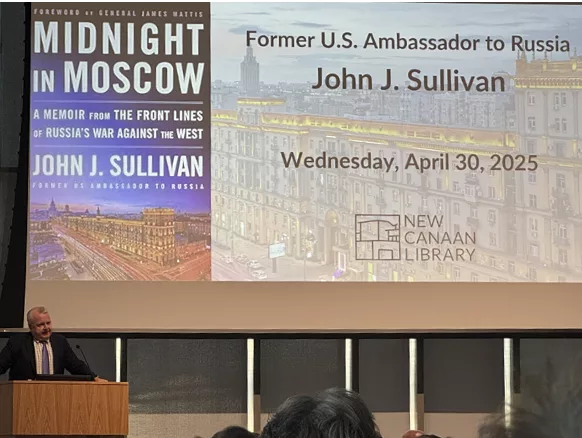
In an evening that mixed history, hockey, and high-stakes geopolitics, former U.S. Ambassador to Russia John Sullivan addressed a full house at the New Canaan Library, recounting in vivid detail his experience as America’s top diplomat in Moscow—and delivering blunt assessments of the war in Ukraine, Vladimir Putin’s worldview, and the U.S. response under both Presidents Trump and Biden.
“I’m a bipartisan critic,” Sullivan said early in his remarks, making clear that neither administration earned a pass in his view. Whether referencing Hillary Clinton’s private server or the Defense Secretary’s tech choices, he emphasized what he saw as a broader failure: “It’s the signaling sense, the lack of leadership… when the signal from the top is we don’t care, it filters down.”
Sullivan served as U.S. Ambassador to Russia from 2020 to 2022, first appointed by President Trump and asked to stay on by President Biden. He described both presidents as initially skeptical of his decision to go—and then to stay—in Moscow. “Trump looked at me like I was crazy,” he recalled. “Biden later told me the same thing.”
But for Sullivan, a self-described “amateur Russophile,” the assignment was personal as much as professional. “My first trip outside the Northeast was to the Soviet Union in 1989,” he said. “And yes, I was obsessed with Soviet hockey.” His tales of Cold War-era games—including a dig at Bobby Clarke’s infamous slash in the 1972 Summit Series—broke the ice with Russians, he said. “They loved it when I said, ‘The Flyers suck.’”
That rapport didn’t prevent him from facing intense surveillance and psychological pressure. “Everyone was followed—everyone,” Sullivan said of his time at the U.S. Embassy. There were even designated “fight rooms” where diplomats and their families could argue in private, away from Russian ears. “It sounds absurd,” he said, “but the Russians would use anything—something said in a heated moment—as leverage.”
What became increasingly clear, Sullivan argued, was that Putin had long decided to invade Ukraine—well before the tanks rolled in February 2022. “The consensus was: this isn’t a bluff,” he said of U.S. intelligence warnings in late 2021. The meeting between Biden and Putin in Geneva that summer barely touched on Ukraine, he said. “They talked about everything else—cyber, Afghanistan. Ukraine? Maybe 10th on the list.”
Sullivan didn’t mince words about Putin’s motivations. “It’s not about communism. It’s imperial nostalgia,” he said. “Putin has said the greatest geopolitical catastrophe of the 20th century was the dissolution of the Soviet Union. Not the Holocaust. Not even World War II. That tells you everything.”
As for the war’s human toll, Sullivan offered one of the evening’s most sobering moments: “Fifteen million Ukrainians—killed, wounded, displaced, or refugees,” he said. “This is the largest land war in Europe since World War II.”
He dismissed any suggestion that Putin could be reasoned with. “There is no negotiator over there,” he said. “He will never surrender… not one inch of territory seized by Russian blood and treasure.”
And while critical of some aspects of the Biden administration’s diplomacy—particularly what he saw as poor coordination with global allies—Sullivan was particularly pointed in his remarks about President Trump’s current posture toward Russia.
“There’s real schizophrenia in the administration,” he said, referring to the Trump campaign and its advisors. “I know people—smart people—who are just embarrassed by how Putin has strung them along.”
According to Sullivan, Trump’s view that Russian victory is “inevitable” is based on bad information. “It’s just not so,” he said, pointing out that nearly 50% of Ukrainian weaponry is now domestically produced, especially drones. “The Ukrainians will not surrender. They can’t. The war’s been done to them, and done brutally.”
In his final remarks, Sullivan called out what he sees as a broader strategic error. “We can’t have a government in Moscow that does this and still gets let back into the G7 or the global system,” he said. “That’s the danger. Not just to Ukraine—but to the world.”
The evening closed with applause, handshakes, and a long line for book signings. Attendees lingered to chat, some trading notes about housing density and zoning—proof, perhaps, that diplomacy and domestic policy aren’t always so far apart.
The next speaker in the library’s series? Former White House Press Secretary Ari Fleischer, set to visit on June 4.



